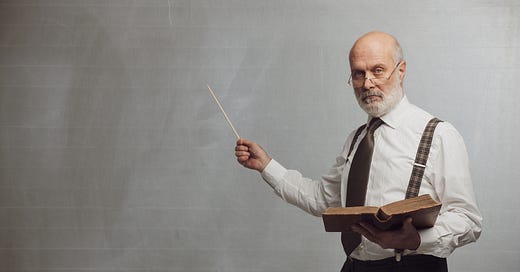E-Pluribus | September 14, 2023
Colleges on the free-speech rollercoaster; what academic freedom is and is not; and tyranny isn't just for majorities.
A round-up of the latest and best writing and musings on the rise of illiberalism in the public discourse:
Joshua T. Katz: College-Ranking Whiplash
What’s a potential college student to do when it comes to considering a future higher educational home given the disparity of popular ranking systems? Joshua Katz at City Journal digs into what goes into these rankings and how they can change so dramatically from year to year.
Anyone who reads the FIRE report and another one involving College Pulse that was released on the same day is certain to experience whiplash. After all, according to this other report, by the Wall Street Journal, the ten best colleges in the country are (in descending order) Princeton, MIT, Yale, Stanford, Columbia, Harvard, Penn, Amherst, Claremont McKenna, and Babson. This year, the Journal, which has been ranking colleges since 2016, changed its methodology to take particular account of “how the schools improve the trajectories of their students’ careers”—in short, “which colleges will do the most to help [students] graduate and make more money.”
For what it’s worth, FIRE does not consider Babson but ranks Claremont McKenna 73rd (it was first in 2021!) and Amherst 195th. And here’s where the other Ivy Plus members fall on the Journal’s list of 400: Duke 16th, Dartmouth 21st, Cornell 24th, Chicago 37th, and Brown 67th. Speaking of whiplash: the top-ranked public university according to the Journal is the University of Florida (15th), which FIRE ranks 231st.
[ . . . ]
Perhaps the most important step an institution can take to fix the problem is to have faculty, administrators, and student leaders explain and model the value of free speech for incoming students from the moment they arrive on campus. To be sure, in the current environment, presentations on this subject can give rise to trouble—somehow free speech is often regarded as more controversial than free abortions—but that’s all the more reason why they should be a required part of every freshman orientation. (A real part: at Princeton last month, Anthony Romero, the executive director of the American Civil Liberties Union, which no longer regularly protects civil liberties, spoke to the entire Class of 2027 at an event about, supposedly, academic freedom and free expression. He took the opportunity to inform his captive audience that today’s enemies are those denying “right to gender-affirming health care” and “attacking critical race theory.”) Indeed, it might not be bad to start earlier yet: what if students applying to college were asked to write an essay on why free speech matters (but also, I suppose, what limitations they believe it would be salutary to impose)?
Read it all here.
James Huffman: The Limits of Academic Freedom
Defining “academic freedom” would likely be a challenge for the average member of the public, but even the main players in the field of education have a hard time pinning it down. Writing for the National Association of Scholars, law professor James Huffman of Oregon’s Lewis and Clark Law School attempts to bring some clarity to the subject.
Academic freedom does not permit professors to do whatever they like in their courses. A law professor assigned to teach a contracts class is free to select what cases and other materials to study and what method to be employed in that study, but not to provide students with a syllabus devoted entirely or largely to constitutional law or to conduct class discussions in a foreign language. Nor is a professor free to devote most or all of a contracts class to commenting on the political issues of the day. Devoting five or ten minutes of a class to disparaging a Supreme Court opinion on a topic unrelated to the course may appear harmless, but at some point such diversions become a failure to adequately perform one’s teaching assignment. Persistent expressions of personal opinions relating to the subject matter of the course can have the same effect of suppressing student inquiry and expression. It contradicts the rationale of academic freedom to contend that professors have the freedom to effectively indoctrinate their students. As Stanley Kurtz writes in National Review, “[m]ost of the academics screaming bloody murder over DeSantis and academic freedom are hypocrites . . . . They don’t believe in the classically liberal presumptions or practices on which academic freedom rests: resisting the temptation to indoctrinate students, willingness to explore competing points of view, hiring faculty based on competence rather than ideology.”
The widely embraced American Association of University Professors 1940 Statement of Principles on Academic Freedom and Tenure provides: “Teachers are entitled to freedom in the classroom in discussing their subject, but they should be careful not to introduce into their teaching controversial matter which has no relation to their subject.” The passage serves to underscore the need for teachers to avoid persistently intruding unrelated material.
By way of analogy, neither the students’ right to free expression nor the institutions’ interest in vigorous debate allow for student comments in class on topics unrelated to the subject matter of a course. For example, the right to free expression does not entitle a student in a mathematics course to comment on the Supreme Court’s abortion jurisprudence. If students are free to express opinions on topics unrelated to the subject matter of a course, the professor will be unable to control and direct progress through the course syllabus. But professors must also have authority to limit student comments related to the subject of the course if they dominate the discussion and thus discourage expression of other points of view or disrupt the progress of the course. Is there any reason academic freedom should entitle professors to similarly disrupt their students’ education?
It is unrealistic and unwise to insist that faculty avoid the sort of off-hand remarks common to human discourse. Revealing a bit of oneself encourages students to do the same. But when repeated off-hand remarks reveal a bias, the effect on students can lead to withdrawal rather than engagement. Better not to disagree with the professor lest he take it personally, even if the disagreement is unrelated to the class subject. If a professor’s revealed bias is related to the subject of the course , the effect on students could be even more problematic.
Read the whole thing.
Yascha Mounk: Steven Levitsky and Daniel Ziblatt on the Tyranny of the Minority
On his podcast at Persuasion, Yascha Mounk interviews authors Steven Levitsky and Daniel Ziblatt about their new book, Tyranny of the Minority. In the transcript excerpts below, the authors explain how the structure of our Constitution allows for political minorities to gain power in this country and how the political conflict in recent years has been exacerbated by it.
Yascha Mounk: Your new book is called Tyranny of the Minority. The founders worried about the tyranny of the majority; many of our institutions are meant to protect us against that. Why do you think today we should be worried about the tyranny of the minority?
Steven Levitsky: We have a Constitution which allows political minorities to govern majorities. That is a product in part of a pre-democratic Constitution; it’s a brilliant document that was revolutionary at its time, and was incredibly successful over a couple of centuries at generating wealth, prosperity, and stability in the United States. But it's a pre-democratic document that enables political minorities to systematically thwart and occasionally govern majorities. Democrats across the world, including in the United States, have throughout history worked to make their democracies more democratic. We think that in the United States we've kind of stopped doing that work over the last half century or so. And we need to get back to that. We need to get back to empowering electoral majorities—obviously, at the same time as we protect basic civil liberties.
Daniel Ziblatt: I think we all agree we're living through a real political crisis. We've had a contested election in 2020, the four years before that were fraught; people are very fearful looking forward to 2024.
We can't understand this crisis we're in without understanding that this constitutional structure, combined with contemporary politics, has left us in a very precarious position. And there's lots of things driving the radicalization of the Republican Party. But we think one major factor is that our Constitution has always favored rural areas, which represent a minority of the population. For most of our history, that really wasn't a big problem, because both parties had urban and rural wings; but now, demographic changes have really led us to a position in the 21st century where the Republican Party is primarily the party for rural areas, while Democrats are primarily the party of urban areas. And so this means that our constitutional structure over-represents rural areas, and so it's no longer necessary at the national level for the Republican Party to win majorities in order to gain power. That has unleashed a set of distorting impacts on our politics that are very dangerous.
Read it all.
Around Twitter
A short thread from the Foundation for Individual Rights and Expression (FIRE) on another heckler’s veto incident at a college:
A thread from Alec Dent (formerly of The Dispatch, now at The Messenger) who finds it curious that a couple of conservative outlets who have warned of the dangers of Communist-China-adjacent TikTok are now themselves on TikTok:
And finally, Tuesday’s E-Pluribus featured a piece by Eboo Patel suggesting “It’s time to overturn the Robin DiAngelo and Ibram X. Kendi [DEI] model.” Now, via Zaid Jilani, comes this news:











